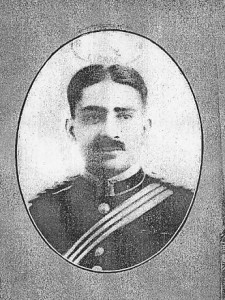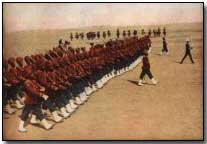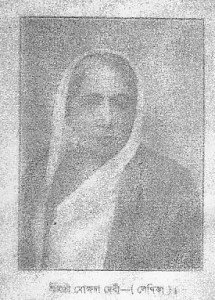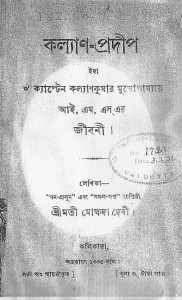Mokkhoda (Mokshada) Debi’s Kalyan Pradeep,
(published 1928)is, in essence, the author’s tribute, as a grandmother, to her daughter’s son, Kalyan, who was a casualty of the Mesopotamian campaign of 1915-16.
Mokkhoda Debi was a minor literary figure in Bengal at the turn of the 19th century. Like Rabindranath Tagore she was born into the Brahmo Samaj, and like many Brahmo women she was well educated and widely read. She married a lawyer and spent many years in Bhagalpur in Bihar. Kalyan Mukherji was her daughter Binodini’s son. Born in 1883, he lost his father at the age of eleven and was brought up in straitened circumstances. While still quite young he seems to have conceived the ambition of becoming a doctor and joining the Indian Medical Service. This was the British Indian army’s medical corps and many distinguished doctors served in it, including Ronald Ross, who won the Nobel Prize in medicine in 1902 (he figures prominently in my Calcutta Chromosome).
For an Indian, joining the I.M.S. was no easy matter. As with the Indian Civil Service, the examinations were held in England. Kalyan studied medicine in Calcutta and then managed to work his way to England as a ship’s doctor. In England he was taken in by a relative who had married an Englishman: they supported him and sent him to Liverpool for further studies in medicine (Mokkhoda Debi’s account of Kalyan’s life in England is one of the most interesting parts of the book).

Kalyan passed the medical service examination on his first try and returned to India. After serving for a while on the North-West frontier, he married, had a daughter and moved back to Bengal. In March 1915 he was ordered to join the Expeditionary Force that was being assembled to invade Mesopotamia. He left Calcutta on March 13, 1915, with another Indian member of the I.M.S., a Dr. Puri who was a close friend of his (Dr. Puri figures in both Kalyan-Pradeep and Abhi Le Baghdad; he was evidently an admirable man, courageous, loyal and a fine doctor).
Kalyan died of a fever two years later in a Turkish prisoner of war camp in Ras el-Ain. He was 34. For his role in the campaign he was awarded a Military Cross.

While in Mesopotamia Kalyan wrote several letters to his family. The letters are reproduced in full in the book, but they account for only a small portion of the text (which is 429 pages long). The rest of the book is devoted to family history, reflections on the Indian past, and, most significantly, to a detailed account of the disastrous British-Indian campaign in Mesopotamia in 1915 and 1916.
Mokkhoda Debi was clearly a woman of great gifts. Although some of her ideas are undoubtedly odd and even objectionable, her account of the Mesopotamian campaign is painstakingly researched and carefully narrated.

But what makes the book truly extraordinary is its curious juxtaposition of domestic life and war – ‘the home and the world’ in other words. Tagore’s great novel of that name (Ghare-baire; ‘The Home and the World’) was of course published in 1916 and Mokkhoda may well have read it. Yet the manner in which she creates her own connection between her home and the world is completely different from that imagined by Tagore.
This is perhaps the most compelling thing about Kalyan-Pradeep – its extraordinarly intellectual and imaginative ambition. Mokkhoda-debi was clearly no rebel, socially speaking. Yet the book is itself an act of rebellion, for it is an assertion of her right to narrate the story of the world, as a woman. She lays claim to this right through grief and bereavement, as a grandmother’s privilege.
The voice of the book is profoundly maternal, at times nurturing and at times riven with grief. Yet the story is one of soldiering, imprisonment and war. It is as if the very act of describing masculine violence, in a woman’s voice, were a way of restoring a primal balance.


I would like to buy this book if available, please let me know where to look for it. Mokkhoda Debi was my grandmother’s grandmother, and I’d heard many stories about her in my childhood and would love to know more about her and the family. My cousin found this link and forwarded to me, thanks a lot for the review.
Unfortunately the book is not in print.
@Pradipta sir… I have read all 3 books of Mokshada devi and I can help you where you’ll find these books. I am a research scholar in bengali literature and very interested to know more about Mokshada devi. Will you please help me with the stories you heard or other informations you have.?
Thanks to Amitav sir also for the review.
Dear Mr Ghosh, I am co-managing a project funded by the Universities of Oxford and Birmingham, the AHRC and partner organisation on a volunteer project to develop an exhibition about the Indian Army in the First World War.
One of the volunteers would like to use this story in the exhibition and I am writing to ask if it might be possible to have hi resolution scans of some of the images for the display panels? All would be acknowledged of course.
I do hope that you don’t mind such an approach.
Thank you
Stephen Barker
Yes that’s fine – but I’m afraid I don’t have any hi-res scans.
Like to have copies of “On to Bangdad” and “Kalyan-Pradip” both.
Please advise.
Thanks
They are both in Bengali, and very difficult to get.